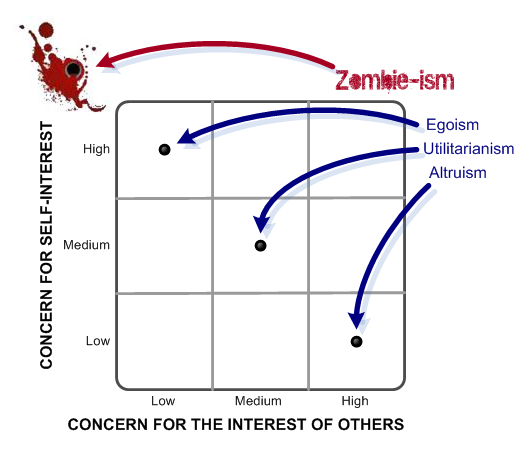One of the things I like about the zombie metaphor is people get it. We all know a zombie when we see it. It doesn't matter if it's a zombie project, customer, vendor, co-worker, or...a meeting. Oh yes, the dreaded zombie meeting. But what if you're on the fence when it comes to identifying zombie meetings? I've written a few posts of what makes a good meeting. It's time to now list what makes a bad meeting. But wait! Why the negativity? Isn't this blog mostly positive information? Sure, but I recently read, on Dan Pink's blog, an explanation of why you should come up with at least one bad idea today. I found that the idea really worked. I would say I decline around 80% of meeting invites. But, why do I decline so many? Here are a few reasons why. Each reason identifies a potential zombie meeting. If you go to these meetings, you risk being sucked into the horde already attending. Take a moment to review the list.
You may be in a Zombie Meeting if...
[1]No purposed reason for the meeting, with actionable events in mind. e.g. “Provide an updated status, identifying risks and opportunities, and identify new action items.”
[2] No defined attendee list, mapped to the actionable events listed in step 1. There is a difference between an attendee list and a communications distribution list. I get meeting invites sent to a program level distribution list. My name isn't even on the email. It just states "If you're interested in attending, the meeting..."
[3] No agenda. Never schedule a meeting without a written agenda. A meeting without an agenda will just wander aimlessly, until you run out of time or someone kicks you out of the room.
[4] No predefined leader, is running the meeting. Zombies don't have leaders. They usually group into a horde. If there is no leader, the meeting will just drift.
[5] No predefined note taker, identified to document action items or take notes. It should not be the same person. Both [4] and [5] should know their roles before the meeting begins and it can't be the same person. Ever go to a meeting with the intent of being an active participant only to be asked to take notes or lead the meeting, a few minutes into the meeting? It will totally change your focus.
[6] Discussion points do not align to the agenda. This part is challenging because you are already in the meeting. You had no idea it was going to turn into a zombie meeting, before accepting. These is no easy way out. If the conversation drifts off topic, either recommend taking the discussion to another forum or start thinking of an exit strategy.
[7] Meeting ends without having the note taker read back discussion points and the action items. Make sure there is a consensus before the meeting ends. If you see meetings ending without a review, add it to the agenda.
[8] Meeting minutes are not sent out within one to two days. Did the meeting even happen? If the minutes are not distributed and approved, then it is like it never happened. Use a distribution list to ensure all necessary people get a copy.
[9] Meeting starts late. If you don’t start on time, you can’t finish on time. Zombies are in no hurry. Those who will arrive late should just call in, rather than disrupt the meeting. I'm not saying you should board up the room entrance with plywood or anything. It's just rude to arrive late to a meeting. If you stick to a schedule and you know the meeting will be a zombie meeting, calling in or use something like GoToMeeting to help shield yourself from the zombies.
[10] There is food. I'm not referring to a cup of coffee or a scone. If there is a food, get it distributed and get it out of the room. Whenever I go to a meeting where there is some kind of food tray, there are always a few attendees who will graze. They're thinking more about the food than they are about the meeting.
Like the drawing? You can find the original for free at Pictofigo








 by Eliyahu M. Goldratt (yes, if someone clicks on that link and buys a book, I would get credit)
by Eliyahu M. Goldratt (yes, if someone clicks on that link and buys a book, I would get credit)